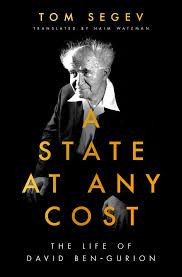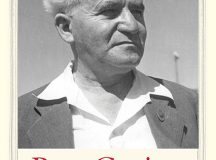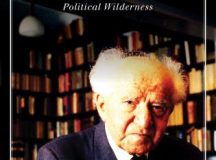In a recent interview with Fathom, Tom Segev, the distinguished journalist and historian and author of A State At Any Cost: The Life of David Ben-Gurion, noted that four books had been published in Israel alone on the topic of Ben-Gurion since he first started working on his biography. Although Benjamin Netanyahu made history In July 2019 by becoming Israel’s longest-serving leader, overtaking Ben-Gurion, Segev suggested to Fathom readers that Israel’s renewed fascination with Ben-Gurion illustrates a yearning for vision and statesmanship, qualities they associate with Israel’s founding father and not with the present occupant of the prime minister’s office.
Segev pays tribute to Ben-Gurion’s pragmatism and achievements in overseeing the establishment of the State of Israel and his impressive record during his 15 years in office as Israel’s first prime minister. Ben-Gurion’s determination to ‘pay nearly any price’ to accomplish his Zionist vision on occasion required immense sacrifice. As the author writes, ‘In Ben-Gurion, Zionism and ego blended into a single entity. It was not easy to live in the country he led: Israelis were expected to place the needs of the collective before their individual expectations and desires. Every citizen was a soldier in the service of history, and Ben Gurion was history’s commander.’
One of Ben-Gurion’s early accomplishments was his key role in establishing Mapai (the United Party of the Workers of Palestine). The author describes this as one of the most significant political developments in Palestine’s Jewish community since the launch of the Zionist movement. Mapai would go on to become the dominant political force in Israel during the first three decades of its existence. Also significant was Ben-Gurion’s role in 1920 in establishing the Histadrut, Israel’s Labour federation, which would become an essential component of the future State of Israel. His arms procurement in the months leading up to Israel’s establishment was critical for the Jewish’s state survival.
Following the war for Israel’s independence, the country’s territory was about 40 per cent larger than that awarded to the Jewish State under the UN partition resolution of November 1947. Segev maintains that Ben-Gurion took ‘a calculated risk’ in improving the state’s boundaries. While Israel’s leader ultimately succeeded in his objective, this came at a very high cost with nearly one per cent of the population losing their lives during the war. In a similar vein, Ben-Gurion could claim credit for his vision of bringing masses of Jews to Israel from the ravaged communities of Europe and the Arab world. Yet, this policy created grave social upheaval and economic problems for the fledgling State of Israel and for the immigrants themselves.
Ben-Gurion was guided by the maxim of ‘maximum territory, minimum Arabs’. On the one hand, he was a pragmatist in accepting the Peel Commission’s partition plan of 1937 and ten years later, taking a similar position with the UN partition resolution of November 1947. Yet all the while, his ambition was to enlarge the territory of what would become the State of Israel. Indeed, one consistent element in Ben-Gurion’s worldview going back to 1919 was that he did not believe there could be peace between Jews and Arabs in Palestine. At best, the conflict could be managed but not resolved. This would provide opportunities for the expansion of Israel’s borders over time.
Segev’s approval of Ben-Gurion comes through most clearly in his assessment of his far-sightedness in nurturing relations with West Germany, France and the US. Ben-Gurion was determined to establish a reparations agreement with West Germany in spite of the violent opposition from Menachem Begin and his supporters on the Right. The leader’s pragmatism is also shown in his commitment to developing a strong relationship with West German Chancellor Konrad Adenauer in spite of strong domestic opposition. Ben-Gurion saw the importance of cooperation with France also, which was pivotal in the development of the nuclear reactor in Dimona.
But this is no hagiography. Ben-Gurion’s failings as a moral exemplar are prominent throughout the book. The reader is left in no doubt that Ben-Gurion was a complex personality riddled with contradictions. He was a morose and vindictive man whose defects as a leader and human being cast a shadow over his remarkable accomplishments. Segev’s masterful utilisation of letters, recently released papers and in-depth analysis of Ben-Gurion’s diary expose failures, warped priorities, prejudice and hypocrisy.
Throughout the 1920s, he campaigned to prevent the employment of Arab labourers while at the same time promoting the narrative that Zionism would develop Palestine for the benefit of all its inhabitants. Advocating coexistence, after all, advanced Zionist diplomacy. Ben-Gurion played a double game with the British, supporting the Empire in public during the war but secretly backing terrorist attacks against the British authorities in Palestine. He knew about the King David Hotel terror plot of 1946 and did little to prevent the bloody outcome.
Segev maintains that Ben-Gurion ‘associated himself with the expulsion and flight of the Arab population’. In one key passage in the book, the author claims: ‘The Nakba (exodus of Palestinian Arabs) haunted him until the end of his life.’ Israel’s founding father, he claims, had great difficulty in ‘reconciling the expulsion of the Arabs with the humanist values he claimed to live by’. The solution to this problem often lay in a capacity for self-duplicity. This was illustrated by the Qibya atrocity of October 1953. Responding to a Palestinian terrorist infiltration attack in which a mother and her two children were killed, an IDF unit commanded by Ariel Sharon indiscriminately shelled the village and blew up homes. Around 70 Arabs, including many women and children were killed in the raid. Ben-Gurion lied and evaded responsibility for Qibya while giving his protection to Sharon. This sent a dangerous message to the IDF rank and file.
Ben-Gurion also showed a callous disregard for the Jewish communities of Europe and for Diaspora Jewry in general. He was incapable of comprehending the destruction of Jewish communities in Europe as a tragedy for European Jewry – from his perspective, it was a catastrophe for Zionism because it had been deprived of European Jews that had the capacity to build the Jewish State. Yet, as Segev points out, Ben-Gurion could not admit that the Zionist leadership in Palestine had an interest in having Jews remain in other countries because of the potential influence they would exert there.
Ben-Gurion’s heartless treatment of his wife Paula and his extra-marital affairs are also on full display. At one point, following the death of Zionist leader Berl Katznelson, which devastated him, his son Amos claimed that ‘Ben-Gurion was more of a friend to Berl than to Paula’. The author suggests that his ill-treatment of Paula may have been influenced by the loss of his mother when he was only 11 years of age. Ben-Gurion’s readiness to defend the sexual misconduct of IDF Chief of Staff Moshe Dayan is instructive here. He used the cases of King David and Horatio Nelson to make the argument that sexual indiscretions should not be the determinant of what makes a great leader.
Ben-Gurion’s cruel treatment of rival leaders is well-known. His hostility towards Prime Minister Levi Eshkol was so great that he refused to attend his funeral. Significantly, most of his disagreements with other senior Israeli figures appeared to revolve around personal issues as opposed to ideological matters. Thus, his discordant relations with Chaim Weizmann, the influential Zionist leader and future president of the State of Israel, revolved largely around personal grievances and were exacerbated possibly by envy of the influence Weizmann enjoyed in Britain. An unflattering cable from the British Embassy in Washington stated: ‘Dr. Weizmann is after all a man of great distinction … whereas Mr. Ben-Gurion is a nonentity … it is rather the case of the elephant and the mosquito. If it comes to a showdown between Dr. Weizmann and Mr. Ben-Gurion, then I put my money on Dr. Weizmann every time.’
Ben-Gurion fiercely condemned Ze’ev Jabotinsky’s revisionists and would later describe Begin’s Etzel (Irgun) national military underground organisation as ‘a gang of Jewish Nazis’ but this appeared to be prompted more by the perception of them as a threat to his leadership than by ideological principle. Segev argues that there was no justification for Ben-Gurion to use force against the Altalena since Begin had already agreed to integrate Etzel’s fighters into the IDF.
One of the few exceptions to the rule was Moshe Sharett, who served as foreign minister and later prime minister during the early years after Israel’s establishment. Sharett’s inclination for self-restraint in conducting reprisals against the Arabs raised tensions with Ben-Gurion. Yet even here, Segev argues, not altogether convincingly, that the differences between the two leaders were more about style than substance.
One surprising omission from A State at Any Cost is Ben-Gurion’s decision to exempt hundreds of yeshiva students from military service. These exemptions have now grown over the years to include tens of thousands of men who would otherwise be serving in the regular army or the reserves. Ben-Gurion’s thinking on such issues may have been based on the mistaken assumption that Orthodox Judaism was a passing aberration rooted in a ‘diasporic version of Judaism’. This was a costly mistake that has resulted in persistent and growing tensions between the ultra-Orthodox and the rest of the country’s Jewish population ever since.
Ben-Gurion showed poor judgment in seriously underestimating the US and Russian response to Israel’s involvement in the Suez operation of November 1956. By this point, the leader’s delusions of grandeur were harming his judgement. He deceived his cabinet colleagues over the development of the nuclear reactor in Dimona. President Kennedy did not trust Ben-Gurion’s claim that the nuclear project was intended only for peaceful purposes, asserting: ‘A woman should not only be virtuous but also have the appearance of virtue.’ Israeli officials were so concerned by an ill-judged letter that Ben-Gurion had drafted for Kennedy that they tried to prevent its dispatch.
Ben-Gurion’s dedication to the Dimona nuclear reactor was guided by his passionate conviction that Israel had to deter its adversaries using all the resources at its disposal. Furthermore, the trauma of the Holocaust loomed large and affected his judgement on this issue. The author does not answer the question of whether Israel’s assumed nuclear capability has actually served to deter its enemies as Israel’s founding father had hoped. Egypt and Syria were apparently not deterred when they launched their surprise attack of October 1973. The debate on this question continues to this day.
Ultimately, Segev’s book is of immense value because it steers clear of mythology and presents his subject in all his complexity. The exhaustive survey of personal letters and diaries enables Ben-Gurion to speak for himself. Israel’s founding father may have been a deeply flawed figure. Nevertheless, it was his bloody-mindedness, dedication to the cause and unswerving sense of purpose that enabled him to play such a crucial role in the birth of the State of Israel and its progress during those perilous early years.





































Segev “forgot” that the British imposed several white papers limiting to a minimum the Jewish immigration to Palestine. That is why the armed uprisig against the British was justified.
He also “forgot” that the majority of the Palestinian refugees left because of the flail of war the Arabs started one day after the UN partition vote, on November 29, 1947. There were some who were expelled like in Ramle ut that too was related to the war they started.
The Arab leadership i 1947/48 is responsible for the nakba the brought on the Palestinian Arabs. If they had accepted the partition and id not start the war there would have bee no refugees.